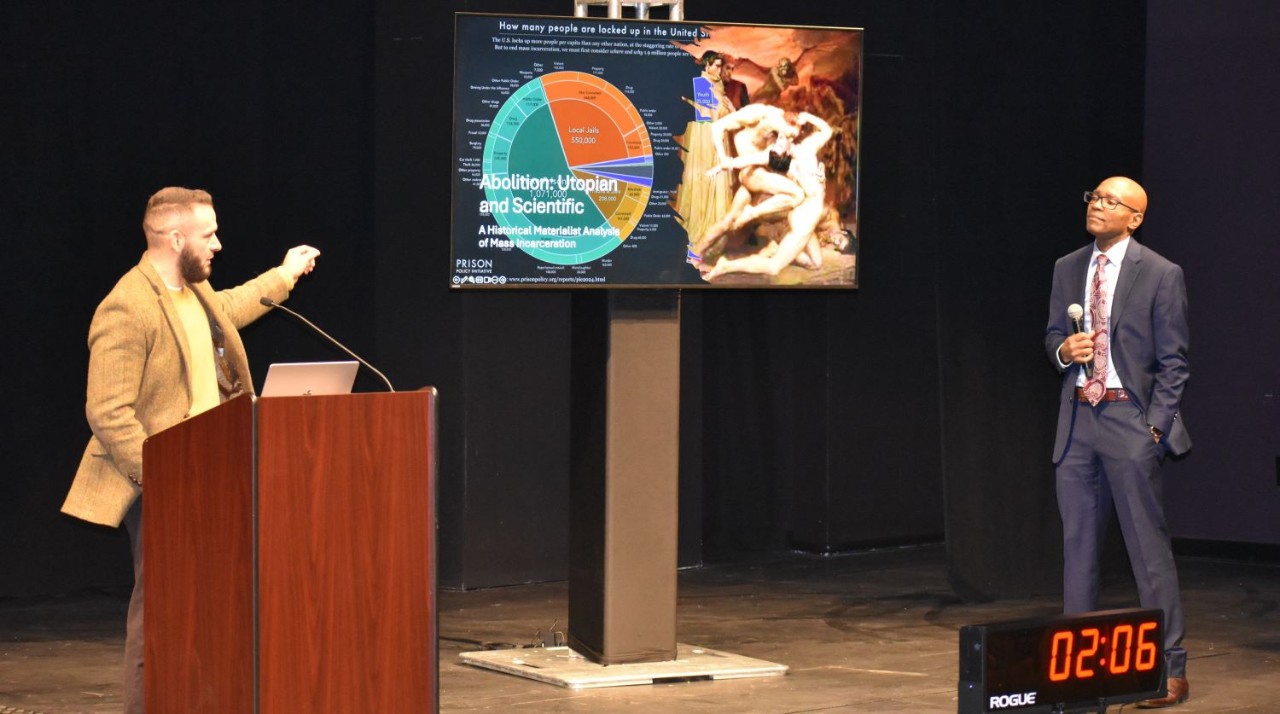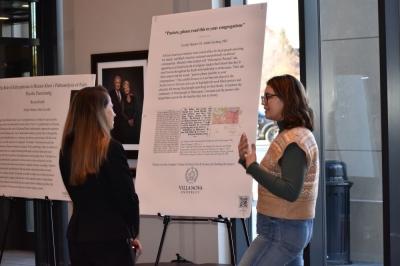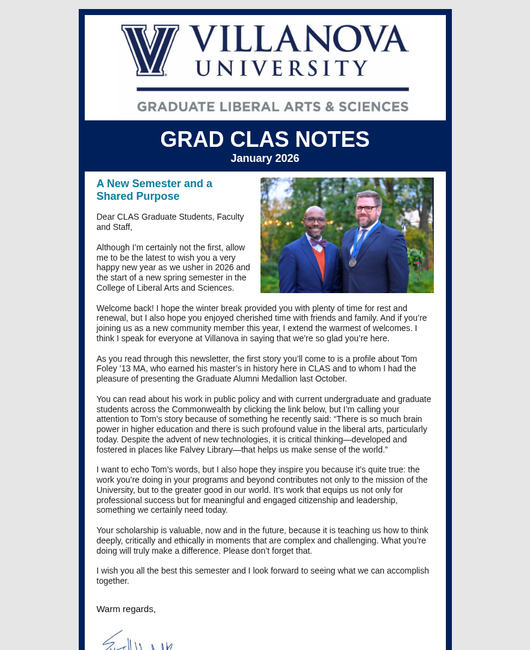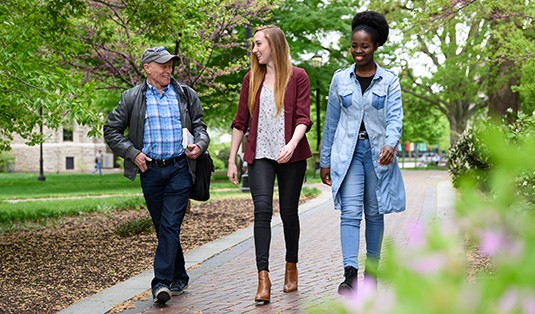Fall 2024 Graduate Research Symposium


The scholarly work of graduate students from the College of Liberal Arts and Sciences took center stage at the John and Joan Mullen Center for the Performing Arts as 36 Villanova University Students presented research during the sixth annual Graduate Research Symposium on Friday, November 15, 2024.
“The motivation behind this effort is to connect what is happening within the scholarly world with folks having everyday experiences so findings of the work can be used to improve everyday lives, and so the impact of the work is spread as broadly as possible,” said Dean of CLAS Graduate Studies Emory Woodard, PhD.
This marked the sixth annual research symposium, which included poster presentations and Three Minute Thesis (3MT)-style oral presentations. The event is designed to celebrate work from students who either received a 2024 Summer Research Fellowship or independently engaged in their work.
Oral Presentations, Mullen Center Court Theatre
Zachary Baker, Biology
“Nano-mechanical Properties and Application of Intertidal and Subtidal Sea Urchin Glue”
Amber Benson, Psychology
“Effect of Anticipatory Stress and Cognitive Control”
Julianna Chen, Education
“Books as mirrors for multiracial children? Exploring multiracial identity development through representation in children’s literature.”
Casey Diaz, Environmental Science
“Evaluating salt marsh restoration success via biogeochemical soil characteristics”
Michael Drummond, Biology
“Does Trophic Plasticity Lead to Bleaching Resistance? Gorgonian Morphology, Metabolism, and Behavior in Rising Temperatures”
Aaron Freeman, Biology
“Quantifying Coastal Wetland Loss in Northeast Florida using Satellite Imagery and Supervised Machine Learning”
Jenna Hassebrock, Environmental Science
“Impact of Long-term Land Cover Change on Long-term Nitrate Export in Southeastern Pennsylvania Watersheds”
Emily Hathcock, Psychology
“Parasocial Relationship Strength and the Need for Social Compensation as a Function of Gender Identification”
Madison Palladino, Psychology
"Slowing Down Fast Fashion"
Jaxon Parker, English
“‘Won’t we bring ourselves with us?’: Post-Revolutionary Irish and Gender Identity in Teresa Deevy’s Katie Roche”
Steven Powers, Philosophy
“Abolition: Utopian and Scientific”
Laura Simpson, Theology
“Doing Time at the Prison Museum”
Anastasiia Tompkins, Psychology
“How Food Insecurity in Childhood Shapes Adolescent Behavior”
Trevor Williams, Theology
“The Canticle of Creatures”
Poster Presentations, Mullen Center Lobby
Johanna Asante, Chemistry
“Development of disinfectant bisQACs based on a bolaamphiphilic architecture”
Matthew Callaghan, Biology
“Investigating the Effectiveness of Cyclodextrin Encapsulated 7-Ketocholesterol Nanoparticle to Alleviate Inflammatory Bowel Disease in Mouse Model”
Hongji Chen, Computer Science
“Comparative Analysis of Urban Delivery Districting Approaches”
Amanda Consylman, Chemistry
“AI-Assisted Design and Laboratory Synthesis of Novel Disinfectant Amphiphiles”
Drew Doughan, Education
“Critical Content Analysis of Contemporary Media and Policy in Literacy Education”
Kenneth Douyon, Environmental Science
“Assessing Community Garden Activity and Security across Philadelphia, PA”
Tertia Gillett, Philosophy
“Pratyabhijñā Cosmopsychism”
Samantha Goldman, Psychology
“How highlighting Black Americans' resilience (vs. difficulties) impacts White Americans' allyship intentions”
Tyra Johnson, Human Resource Development
“Exploring the Dynamics of Diversity, Equity, and Inclusion (DEI) Practices: Insights from DEI Practitioners”
Emily Khoo, Psychology
“Long-Term Effects of Early Life Exposure to Fluoxetine in Juvenile C57BL/6 Mice”
Bryan Knittle, Philosophy
“The Role of Schizophrenia in Melanie Klein's Pathoanalysis of Early Psychic Functioning”
Mariah Lees, Psychology
“The role of pattern complexity in predicting sequences”
Julia Linde, History
“The State of Accommodations for Neurodivergent Children in History Museums”
Madison Little, Chemistry
“Operando Spectroscopy Investigation of Methane Reforming in Fuel Cells with Raman Spectroscopy”
Gary Nicolau, Biology
“Integrative taxonomic investigation into the gekkonid genus Afroedura”
Janis Parker, History
“Pastors, please read this to your congregations”
Matthew Riddle, Theology
“Spiritual but not Religious Christianity?”
Phillip Rivera, Biology
“Investigating the influence of hydrology and nitrogen enrichment on pneumatophores of Avicennia germinans”
About Villanova University’s College of Liberal Arts and Sciences: Since its founding in 1842, Villanova University’s College of Liberal Arts and Sciences has been the heart of the Villanova learning experience, offering foundational courses for undergraduate students in every college of the University. Serving more than 4,500 undergraduate and graduate students, the College is committed to fortifying them with intellectual rigor, multidisciplinary knowledge, moral courage and a global perspective. The College has more than 40 academic departments and programs across the humanities, social sciences, and natural and physical sciences.


